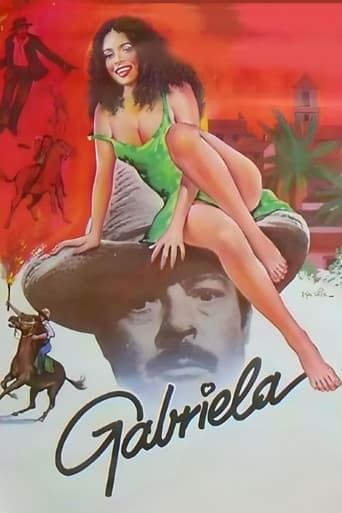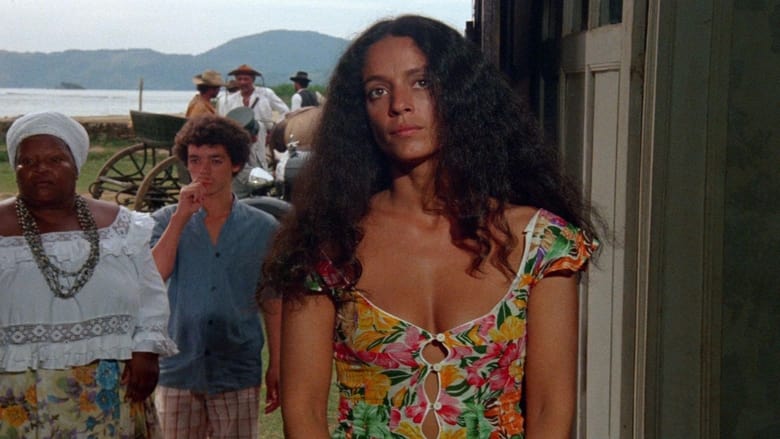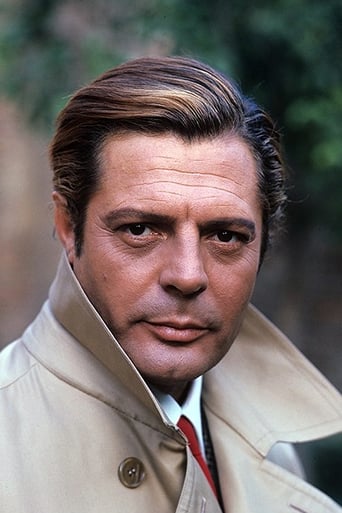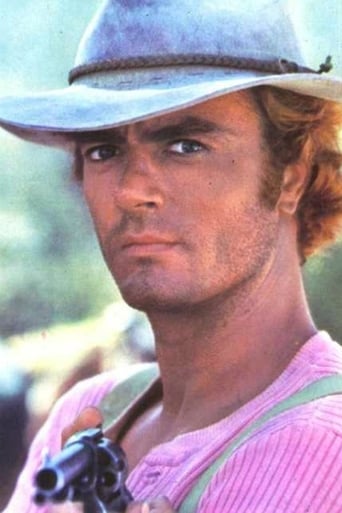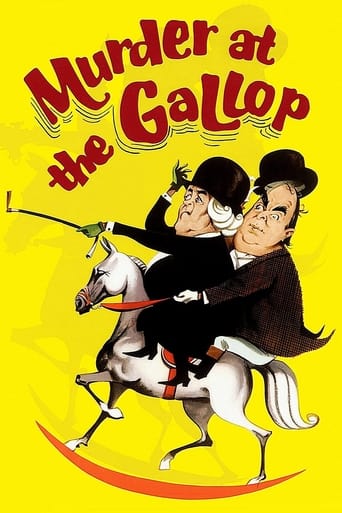Gabriela (1983)
In 1925, Gabriela, a poor, uneducated, yet charming woman becomes cook, mistress, and then wife of Nacib, a bar owner in Ilhéus, a small Brazilian coastal town run by the local colonels.
Watch Trailer
Cast
Similar titles



Reviews
You won't be disappointed!
To me, this movie is perfection.
One of my all time favorites.
When a movie has you begging for it to end not even half way through it's pure crap. We've all seen this movie and this characters millions of times, nothing new in it. Don't waste your time.
Now that I have finished watching the soap opera Gabriela (2012) based on the 1958 Jorge Amado's novel "Gabriela, Cravo e Canela", I felt some curiosity to also watch this movie, filmed in 1983 and based in the same novel.This movie was a consequence of the success of the first Gabriela adaptation to the screen. In fact, in 1975, this novel by Jorge Amado was adapted for the first time to a TV show and this soap opera was a tremendous success either in Brazil and Portugal (and many other countries as well, later).So, a few years later, 1983, "Gabriela, Cravo e Canela" was adapted to cinema by Bruno Barreto. The actress playing the main role, GABRIELA, is the same of the first soap opera, Sonia Braga, and to play NACIB (another important character in the plot) a great figure of the seventh art was called: Marcello Mastroianni! So, as we can see, the cast to this film was not bad, at all! However, it's a movie, with just one hour and half to tell a story like Gabriela, so, many characters present in the original novel were cut or had minimal roles. In the soap opera it was different of course, the plot was extended and all the characters were detailed built and described. I haven't totally read the original novel but by what I know of it, the 2012 soap opera even create some new characters and subplots focused on them (the character Lindinalva for instance). So, watching the movie, at parts I felt that one hour and half was just too short to describe this story as it deserves. Some scenes felt as they were hardly justified. At parts it seems that just one person that already knows the plot will understand their actions! Nevertheless the chronology of the events is more accurate to the original novel than in the soap opera. In fact it begins were the novel begins (the murder of DONA SINHAZINHA) and follows the same line of the novel until the end. But there's an important detail: this film is focused essentially on the GABRIELA and NACIB romance and not on the subplot about politics which was also very important in the novel. In fact characters like CORONEL RAMIRO BASTOS and MUNDINHO FALCAO are relegated to a secondary plan and have little importance in the movie's plot.I guess it might have been a choice of the director: tell this story on the sensual and romantic side and putting the subplot of politics and social criticism to a secondary plan. In fact, as I said before, one hour and half is too short to deeply describe both plots, so he decided to go deeper on the romance and sensuality OK, it was a choice and we can't complain, especially when we see Sonia Braga Another feature that is certainly more accurate in this film than in the recent soap opera is the description of Ilhéus and all the settings. Back to 1925 a city like Ilhéus would certainly look like it's portrayed in this film, rather than it is in the 2012 soap opera (not to mention the cabaret Bataclan, which is not described in the movie but it's portrayed like the cabaret of the film MOULIN ROUGE in the soap opera!).So, this adaption of "Gabriela, Cravo e Canela" is mostly a sensual romance, a story focused essentially on NACIB and GABRIELA. The film is entertaining and the actors do a good job, I just think it ends being too short as I said before. I felt that plenty of their actions are hardly explained and one that doesn't already know about the novel's plot won't understand many of their actions.
The romance between Gabriela, a beautiful rural woman (Sonia Braga) and a Turkish businessman (Marcello Mastroianni) that confronted the prude society of Bahia, in the beginning of the 20th Century, presented in this film explodes in sensuality, and a little bit of humor but all of that wasn't enough to make me give a thumbs up for it at the ending.Many tiny little plots around the main story ruined the film; the excessive sex scenes between the main stars are quite the same thing repeated over and over; and things built up and disappear out of nowhere. Throw your rocks on me because I'm from Brazil and I've never read the book written by Jorge Amado, one of Brazilian greatest writers so I can't construct my point of view comparing both medias. But what I did saw was a film that was quite good during its forty, fifty minutes, then it was just tiresome, annoying, with nothing much to say, and nothing much to show. What was the point anyway? A love relationship only based in sex? What was the reason of Gabriela cheating on his beloved husband? Everything is too much trite and director Bruno Barreto didn't know exactly what he was doing here, this wasn't material for him, and probably he was just trying to repeat the success of his previous adaptation of Amado's book "Dona Flor e Seus Dois Maridos" (1976) which had the highest box-office performance of all time around here, holding the record of most seen film for almost 20 years, losing its place to "Titanic" (1997). The supporting cast has some good moments here (specially Ricardo Petragalia playing the teacher); Mastroianni impressed me a little but I still want to know if his voice was dubbed or he really speak Portuguese mixed with Spanish, something almost inaudible to hear. Braga displays lots of sensuality and nude scenes, things that worked a lot here in the 1980's, now it's just silly.Overrated in all senses, this film almost made it through being a good film. The excess in story, soundtrack, direction and the lack of a higher purpose ruined the experience for me. 5/10
Gabriela is a great romance by Jorge Amado, a great Brazilian writer. In 1975 it was adapted to TV novel. It was very successful and we could see a young Sonia Braga at the beginning of her career. Years later we could see Sonia again but she was not young anymore. But her talent was much better. The movie only shows sexy scenes and the political history was on the second hand unfortunately. But there was a present for us. We could see in a short time a great Brazilian actress called Maria Zenaide, with her beautiful eyes making a little participation. On the other hand we could see her again and we could ask where are the great actresses of Brazil ? Unfortunately Brazil is a country with no memory and only shows what the directors think are good. Thanks God we can see Maria Zenaide making educacional commercial and she still sings Brazilian Songs though her band Grupo Avelloz, with good singers and musicians: Will Tom and Teresa Carvalho(both from Dama de Paus band), Jorge Som and Chaguinha Lima(from Siri Atômico band).
Gabriela, Clove & Cinnamon was the novel which marked Jorge Amado's break from pure class warfare--he received several Stalin prizes in his early career!--and embrace of the joys of Brazilian humanity. Sonia Braga has starred in adaptations of three of Amado's novels, all of them magnificent (the other two are Dona Flor and Tieta). I won't say she is here at her sexiest--Sonia Braga is sexy any time she's on screen--but this is one of her best movies, helped much by the other players, among them, curiously, Marcello Mastrioanni as the Syrian immigrant who hires Gabriela as cook and quickly finds himself in a deeper relationship. The plot here involves attitudes toward women and their sexuality, an eventual welcome breakdown of the double standard. and progress of law and order in a society too often ruled by lawlessness and custom. Amado dies without getting a Nobel Prize for Literature: Gabriela and the other two films mentioned convincingly demonstrate why he should have won it.
